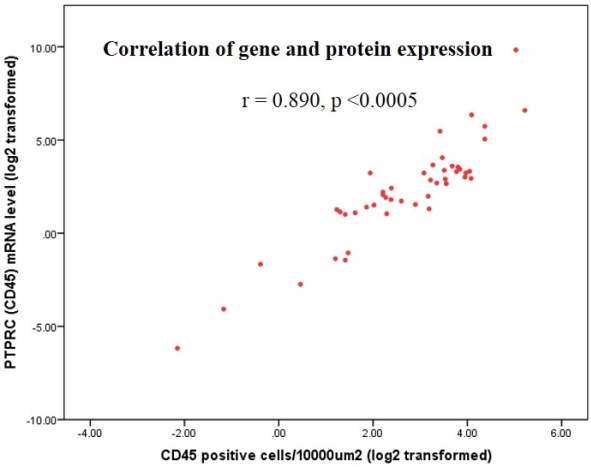Highly Correlative Whole-Tissue Gene/protein Signatures to Score FFPE Transplant Biopsies with Inflammation and Acute Rejection
Unversity of California San Francisco, San Francisco.
Meeting: 2018 American Transplant Congress
Abstract number: D197
Keywords: Biopsy, Gene expression, Kidney transplantation
Session Information
Session Name: Poster Session D: Kidney: Acute Cellular Rejection
Session Type: Poster Session
Date: Tuesday, June 5, 2018
Session Time: 6:00pm-7:00pm
 Presentation Time: 6:00pm-7:00pm
Presentation Time: 6:00pm-7:00pm
Location: Hall 4EF
Background: We have previously reported the quantification of a common immune response module (CRM) of 11 genes to identify and score acute rejection (AR) across different solid organ tx on kidney tissue collected in RNA preservation solution. Unfortunately, these assays can only be applied where unfragmented and good quality RNA.
Methods: We evaluated the expression of the CRM-genes and 9 immune cell specific genes as a metric for sub-clinical and clinical tx injury in FFPE kidney tx tissues using a combined approach of tissue section barcoded oligos for mRNA transcript quantification and multiplex immunofluorescence and immunohistochemistry on the same tissue slice in parraffin blocks collected from 40 kidney tx patients (8 each from normal functioning (NL), antibody mediated rejection (AMR), T cell mediated rejection (TCMR), borderline inflamammtion (BL), and BK virus nephropathy (BKVN). RNA extraction from FFPE sections was optimized. Immunohistochemistry was performed on selected targets on FFPE sections adjacent to the sections used for gene expression studies.
Results: Kidney injury resulted in a significant increase in many gene subsets. The composite CRM gene expression score, set from previous studies (NL<2; AR >6) was able to differentiate allograft injury from stable function. The average CRM score was 1.5 in NL tx and significantly greater in TCMR (8.3; p = 0.0080), AMR (4.4; p = 0.0079), and BKVN (5.6; p = 0.0084). Inflammatory cell count (ICC) showed excellent correlation with selected mRNA levels (Spearman's rho = 0.890, p < 0.0005) the CRM score was (Figure 1)  .
.
Conclusion: Using advanced mRNA and protein quantification protocols from FFPE paraffin blocks allows concomitant assessment of transcriptional, protein coupled with histology in the same tissue section, with differential quantification of immune injury. This study provides novel strategy for large scale re-analysis of archival FFPE archival tx blocks for clinical and histological re-classification and for prospective assessment in the context of clinical trials.
CITATION INFORMATION: Sigdel T., Nguyen M., Dobi D., Hsieh S-.C., Liberto J., Vincenti F., Laszik Z., Sarwal M. Highly Correlative Whole-Tissue Gene/protein Signatures to Score FFPE Transplant Biopsies with Inflammation and Acute Rejection Am J Transplant. 2017;17 (suppl 3).
To cite this abstract in AMA style:
Sigdel T, Nguyen M, Dobi D, Hsieh S-C, Liberto J, Vincenti F, Laszik Z, Sarwal M. Highly Correlative Whole-Tissue Gene/protein Signatures to Score FFPE Transplant Biopsies with Inflammation and Acute Rejection [abstract]. https://atcmeetingabstracts.com/abstract/highly-correlative-whole-tissue-gene-protein-signatures-to-score-ffpe-transplant-biopsies-with-inflammation-and-acute-rejection/. Accessed February 16, 2026.« Back to 2018 American Transplant Congress
